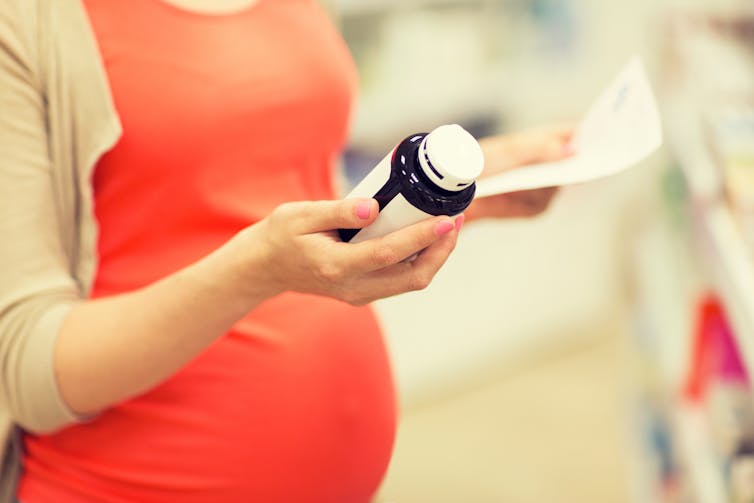Thalidomide survivors are receiving an apology for the pharmaceutical disaster that changed pregnancy medicine
- Written by Luke Grzeskowiak, Channel 7 Children's Research Foundation Fellow in Medicines Use and Safety - Flinders University & South Australian Health & Medical Research Institute, Flinders University

Prime Minister Anthony Albanese will deliver a national apology[1] to thalidomide survivors and their families today. More than 60 years since the medication had devastating consequences[2] when taken by pregnant women, the apology recognises the government’s role in the tragedy and its enduring impact.
Had the government acted more swiftly to issue public warnings and restrict thalidomide use when concerns were first raised, as many as 20% of Australia’s thalidomide survivors may not have been affected[3].
Today, protecting pregnant people and the fetus means ensuring there is high quality science to guide medicine use.
Read more: Remind me again, what is thalidomide and how did it cause so much harm?[4]
What is the thalidomide story?
Thalidomide was developed in the 1950s in Germany. Originally intended for use as a sedative or tranquilliser, by the late 1950s it was soon being widely promoted as a safe and effective treatment for morning sickness in pregnancy.
At the time, it was commonly thought the placenta would act as a barrier[5] to stopping medicines reaching the fetus in the womb. Animal studies showed[6] low toxicity and no tests were done involving pregnant women.
Thalidomide rapidly become available for use around the world, including the United Kingdom and Australia. The United States famously rejected marketing approval, largely owing to the efforts of pharmacologist Frances Kelsey[7] who was concerned about the paucity of safety data available.
As use increased worldwide, so too did reports of babies being born with distinct birth malformations. Thalidomide embryopathy[8] is characterised by shortening of the arms or legs. But when taken in early pregnancy it can also result in sight or hearing loss, facial paralysis and impact to internal organs.
The first public report linking thalidomide to birth malformations was made by an Australian doctor William McBride[9] in The Lancet journal in 1961. Soon after, the medicine began to be withdrawn from the market. By this time, it was estimated thalidomide led to thousands of miscarriages and deaths of newborns worldwide and left more than 10,000 children with lifelong disability.
A careful comeback
In the last decade thalidomide has made a comeback. Thalidomide is being used in the treatment of certain cancers[10] and other relatively rare conditions such as leprosy[11]. Most recently, it was investigated as a potential treatment for COVID[12].
While its return may cause anxiety, there are strict controls limiting its use. This includes requiring people who could get pregnant to take regular pregnancy tests and multiple forms of birth control.
Prescribing thalidomide involves careful counselling and discussion of risks involved. Some may prefer to see thalidomide gone forever. For others, it represents a potential life-changing treatment.
Read more: Thalidomide: the drug with a dark side but an enigmatic future[13]
Thalidomide changed medicine – for better and worse
The continued availability of thalidomide raises important ethical questions about how we balance the need to make available effective treatments, while ensuring we protect the most vulnerable.
The thalidomide tragedy represents a significant historical turning point in medicines testing and regulatory oversight. There is now much tighter testing of medicines in both animals and humans before they are marketed and closer scrutiny of their potential side-effects.
But there is a dark side. Thalidomide also gave rise to an ongoing hesitancy towards the testing and use of medicines during pregnancy. This has stifled the critical development of new and existing medicines to treat common life-threatening conditions in pregnancy. Globally, many thousands of women and babies die each year[14] from conditions such as preterm birth and pre-eclampsia. Yet, in the last 30 years, only one new medication has been developed specifically for use to treat such complications[15].
Such hesitancy was most recently demonstrated during the COVID pandemic where pregnant women were excluded[16] from participating in the first vaccination and treatment clinical trials. This led to uncertainty about how to best protect vulnerable pregnant individuals and their children from the effects of COVID, leading to otherwise avoidable[17] deaths.
Read more: Take care with paracetamol when pregnant — but don't let pain or fever go unchecked[19]
What’s next?
A national apology represents an important step in the healing process for those affected by thalidomide and an opportunity to reflect on its legacy.
The most important legacy should be one of ensuring we have adequate data to support the safe and effective use of medicines in pregnancy, rather than one of excluding pregnant people from research or using medicines.
This requires greater government investment and support into how we develop, evaluate, monitor and guide medicines use in pregnancy. A coordinated national approach across all sectors to identify, outline and implement strategies[20] could ensure pregnant people have access to the modern medicines they deserve. Otherwise we risk repeating failures of the past and relegating pregnant people to the status of therapeutic orphans.
References
- ^ national apology (www.abc.net.au)
- ^ devastating consequences (theconversation.com)
- ^ may not have been affected (www.aph.gov.au)
- ^ Remind me again, what is thalidomide and how did it cause so much harm? (theconversation.com)
- ^ placenta would act as a barrier (pubmed.ncbi.nlm.nih.gov)
- ^ showed (www.sciencemuseum.org.uk)
- ^ pharmacologist Frances Kelsey (www.smithsonianmag.com)
- ^ Thalidomide embryopathy (www.ncbi.nlm.nih.gov)
- ^ Australian doctor William McBride (www.bmj.com)
- ^ certain cancers (www.annalsofoncology.org)
- ^ leprosy (www.sciencedirect.com)
- ^ potential treatment for COVID (www.ncbi.nlm.nih.gov)
- ^ Thalidomide: the drug with a dark side but an enigmatic future (theconversation.com)
- ^ die each year (www.who.int)
- ^ complications (www.birminghamhealthpartners.co.uk)
- ^ excluded (www.thelancet.com)
- ^ avoidable (www.nature.com)
- ^ Shutterstock (www.shutterstock.com)
- ^ Take care with paracetamol when pregnant — but don't let pain or fever go unchecked (theconversation.com)
- ^ identify, outline and implement strategies (www.thelancet.com)

















